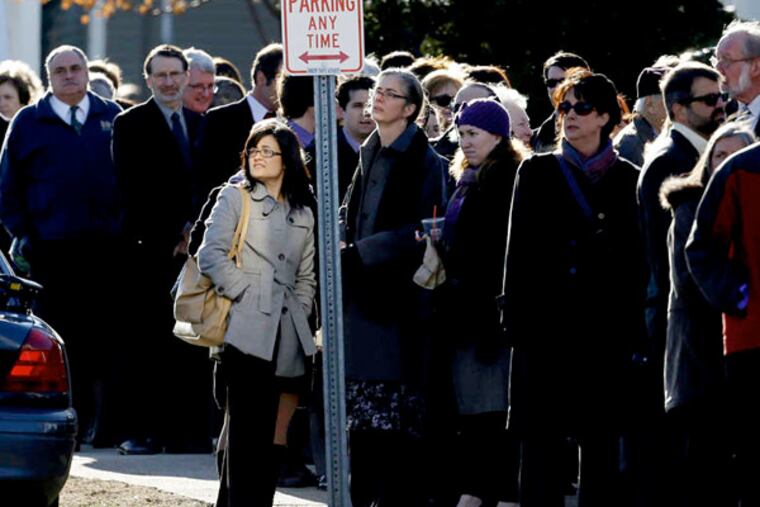Reporting on heartbreak: It's heartbreaking
NEWTOWN, CONN. - Ever since the horrific school shootings here, talk has focused on community. The small community of Sandy Hook Elementary, where 20 first-graders and six adults were executed by a 20-year-old who left few clues as to why.

NEWTOWN, CONN. - Ever since the horrific school shootings here, talk has focused on community.
The small community of Sandy Hook Elementary, where 20 first-graders and six adults were executed by a 20-year-old who left few clues as to why.
The small community of Newtown, devastated by anguish.
The small community of Connecticut, the third-smallest state in the nation, and now the location of one of the worst school shootings in history.
And within that community is a still smaller one - a community of journalists.
Before my recent move to Philly, I was one of them. For years, we gathered around the same news conferences and crime scenes and courtrooms.
We knew which TV reporter always asked the first question, which newspaper reporter had the best sources, which one always wandered off looking for snacks.
Year after year, often alongside the very same people, we chronicled the small and the large, the good and the bad.
We did this not because of some voyeuristic need or to get rich or famous. But because as reporters - as members of this smaller community - we saw value in being present, in bearing witness.
What that means is telling truths - including the awful truth of how much is broken when babies are slaughtered in a place that is supposed to be safe.
About the shame that should come crashing down on every one of us if we allow this devastation to pass without making sure politics and apathy and blind ignorance don't stop us from at least trying to keep it from ever happening again.
Usually, as reporters, we are on the other side of chaos and crisis. Safe - to some degree - by the detachment necessary to do the job. But not on Thursday.
On Thursday, I joined reporters who were once part of that small community of journalists and others who still are, as one of our own said goodbye to his stepdaughter - one of the 26 victims of the Sandy Hook Elementary shootings.
Lauren Rousseau was a 30-year-old substitute teacher at Sandy Hook who was killed with her entire class of first-grade students.
Inside her childhood church, friends rewound her life: sixth-grade sleepovers; the first, unsure day at college; the dates that turned into true love cruelly cut short.
In describing their short year together, Rousseau's boyfriend said: "We lived."
Even before deciding I would write something, I knew I had to go. I wasn't entirely sure why. Why do any of us go to wakes or memorials or funerals? For the dead, the living? Ourselves?
I went because Lauren's stepfather, Bill Leukhardt, was a colleague, a kind and generous man who was as quick with a joke as an offer to get you a cup of coffee or a snack from the vending machines.
I went for the same reason so many in the line of hundreds at the church came: We owed it to him and his family.
I went because I was compelled to bear witness.
Before I went to the church, I drove through Newtown, the Newtown that like so many across the country, I'd been watching, and grieving for, from afar.
Images I'd spent the last week reading about or watching on television lay before me in excruciating detail: memorials piled with mountains of stuffed animals that belonged in children's rooms, not at the side of the road; trees filled with paper and metal angels bearing the names of children, many of whom were being buried that day.
Anguished signs were everywhere, on overpasses, store windows and front lawns.
"Together we are strong." "Our hearts are broken."
"Newtown and the world will remember each and every one of your forever. We promise that your sacrifice will make a difference for our future."
I stopped at one of the memorials, where a woman and her two children stood. We didn't speak; we just stared silently, blankly, at the symbols of grief before us.
I only caught a glimpse of Bill and his family at the church. But had I talked to him, I would have done what any of us would have. I would have hugged him tight and told him how sorry I was.
I would have told him that our hearts are broken but that after we grieve, his community will still be with him.